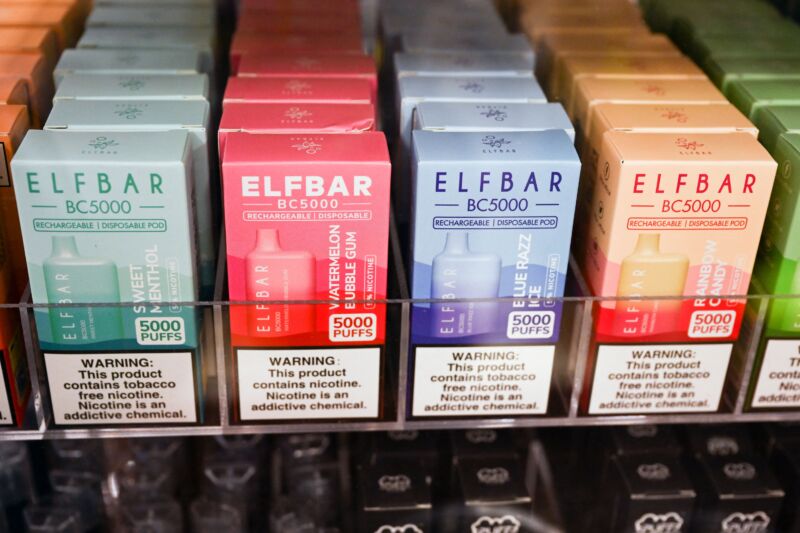American Cancer Society to vape company: Keep our name outta your mouth

The American Cancer Society has made it clear that it wants nothing to do with Elfbar after the infamous Chinese vape company suggested last month that they had a partnership. The ACS also says that Elfbar can keep its money.
“The American Cancer Society does not partner with or accept funds from tobacco companies and has sent a cease and desist letter to Elf Bar to prevent further public deceit,” Timothy Phillips, the chief legal officer for the ACS, said in a statement to Stat News. In an email to Ars, the society said it sent the cease-and-desist letter to Elfbar last Friday and has not received a response.
Elfbar did not immediately respond to a request for comment from Ars.
The dustup began in mid-January, when Elfbar announced a program called the “Lighthouse Guardian Program” that it said was aimed at preventing underage use of its products. The program included a donation component, in which Elfbar said it would make a 10-cent donation to the American Cancer Society every time someone clicked a button on its website labeled “Join to Light.”
In a press release on the program, Elfbar CEO Victor Xiao was quoted as saying that “the total amount of our donation will be over ten thousand dollars.”
Once clicked, the button turns to “Thanks For Lighting Up” and opens a box where a user is asked to enter their email address and write a comment. “You are making a different[sic],” Elfbar tells its users. It’s unclear how users’ email addresses will be used.
At the time of publication, Elfbar’s website had logged over 30,000 clicks.
Phillips told Stat that the ACS sent Elfbar a cease-and-desist letter demanding that the company “immediately cease all use of the American Cancer Society name that falsely implies association with ACS,” including removing all mention of ACS in the company’s marketing materials.
Elfbar appears to have deleted the press release that names ACS, which was circulated on PR Newswire—though it can still be found republished elsewhere. The Chinese vape company’s website has also removed the reference to the ACS and now says its 10-cent donations will go to an unnamed “non-profit organization.” However, as Stat noted, its Facebook account still contains a post that identifies the ACS.
Regulatory loophole
Beyond irking the ACS, Elfbar’s ostensibly anti-youth vaping program is likely to roil other health and youth advocates, who blame Elfbar and makers of similar products for continuing to addict teens to nicotine through regulatory loopholes. Elfbar sells disposable vape products that can still include youth-friendly flavorings. It sells flavors such as vanilla ice cream, strawberry watermelon bubblegum, and blue cotton candy. Such fruity and youth-enticing flavors gained widespread popularity among teens with the rise of Juul several years ago. And they were later banned by the Food and Drug Administration for that reason.
But here’s the loophole: The regulator only banned such flavorings from pre-filled, closed-system e-cigarettes like Juul. Disposable or refillable systems are not prohibited from having fruity flavors. And as such, their popularity skyrocketed following the FDA’s limited ban that went into effect in early 2020. Although use of e-cigarettes has declined since a peak in 2019, the FDA has drawn sharp criticism from health and youth advocates for being too slow to keep up with the vape market.
According to data from the Centers for Disease Control and Prevention, use of disposable vape products increased by approximately 1,000 percent (from 2.4 percent to 26.5 percent) among high school e-cigarette users between 2019 and 2020, and approximately 400 percent (from 3.0 percent to 15.2 percent) among middle school e-cigarette users in that time.
A 2022 CDC study on youth vaping found that the trend has continued. Among the 2.55 million US middle and high school students who reported using e-cigarettes in 2022, disposable vape products were the most common type of product used, with use rising to 57 percent of high school e-cigarette users and to 46 percent of middle school users. The most common brand reported was Puff Bar (use of Elfbar was not specifically surveyed in the study).
Among all adolescent e-cigarette users in 2022, 85 percent used flavored products. Specifically, 70 percent reported using fruity flavors, and 40 percent reported using candy, dessert, or other sweet flavors.
https://arstechnica.com/?p=1917612